WEARABLE devices such as smartwatches, designed to track physical activity, may also help detect early signs of diseases like Covid-19 and heart conditions, according to a recent study.
Researchers from the University of South Australia reviewed 28 studies involving 1.2 million participants. The findings suggest that smartwatches and activity trackers could identify Covid-19 status in 88 out of 100 cases, with similar accuracy to rapid screening tests.
The study also found that wearables could detect atrial fibrillation, an irregular heart rate, in 87 out of 100 people. Additionally, falls were correctly identified in 82 out of 100 cases using the devices. The research has been published in the Journal of Medical Internet Research mHealth and uHealth.
Originally designed to monitor fitness activities like exercise, wearable technology now offers features such as blood pressure monitoring, heart rate tracking, sleep quality analysis, skin temperature checks, and stress level monitoring.
"Our systematic review shows that wearable activity trackers have significant promise in detecting Covid-19 and heart conditions in real-world settings, which has the potential to improve personal health monitoring," said lead researcher Ben Singh from the University of South Australia.
The research focused mainly on detecting Covid-19, while a smaller portion looked at heart conditions and falls. The most promising findings were related to atrial fibrillation, where the devices demonstrated high sensitivity and specificity, similar to clinical tests.
"Sensitivity and specificity are important measures indicating how often a device shows true or false positives or negatives," the authors noted. "The most promising results were observed for the detection of atrial fibrillation," they added.
"Wearable trackers not only empower people to proactively manage their health, but they enable them to detect health issues in real-time," Singh said. "This means that they can respond to any concern quickly and potentially avoid serious health problems."
(With inputs from PTI)




